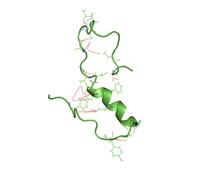Podcast: Play in new window
BOB HIRSHON (host):
Blocking Alzheimer’s Disease. I’m Bob Hirshon and this is Science Update.
In a promising animal study, researchers dramatically reduced a key player in Alzheimer’s disease: so-called A-beta compounds that form plaques in patients’ brains. They did it by shutting off an enzyme called jnk3. Ohio State University neuroscientist Sung Ok Yoon says eliminating it made a big difference in mice that were genetically predisposed to Alzheimer’s.
SUNG OK YOON (Ohio State University):
We saw about 86 percent reduction in the amount of A-beta produced. I think that’s the biggest drop that’s been reported so far.
HIRSHON:
Deleting the enzyme also protected the mice’s cognitive functioning, keeping them relatively close to normal. Yoon says it appears that jnk3 is part of a destructive, runaway cycle of cellular stress that underlies Alzheimer’s. It’s not yet clear what its positive functions are, but blocking it safely could be an effective strategy against the disease. I’m Bob Hirshon for AAAS, the Science Society.

